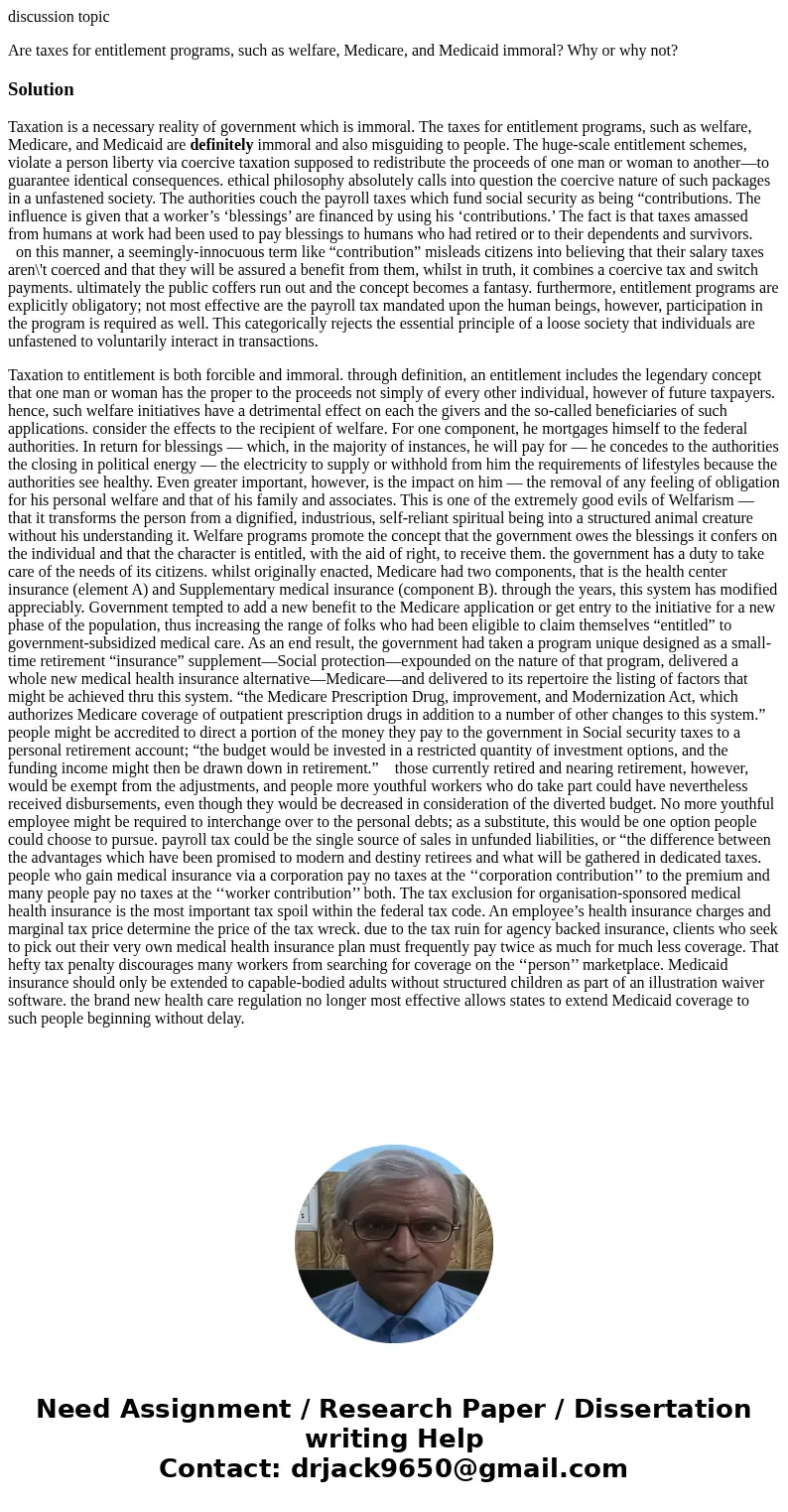discussion topic Are taxes for entitlement programs such as
discussion topic
Are taxes for entitlement programs, such as welfare, Medicare, and Medicaid immoral? Why or why not?
Solution
Taxation is a necessary reality of government which is immoral. The taxes for entitlement programs, such as welfare, Medicare, and Medicaid are definitely immoral and also misguiding to people. The huge-scale entitlement schemes, violate a person liberty via coercive taxation supposed to redistribute the proceeds of one man or woman to another—to guarantee identical consequences. ethical philosophy absolutely calls into question the coercive nature of such packages in a unfastened society. The authorities couch the payroll taxes which fund social security as being “contributions. The influence is given that a worker’s ‘blessings’ are financed by using his ‘contributions.’ The fact is that taxes amassed from humans at work had been used to pay blessings to humans who had retired or to their dependents and survivors. on this manner, a seemingly-innocuous term like “contribution” misleads citizens into believing that their salary taxes aren\'t coerced and that they will be assured a benefit from them, whilst in truth, it combines a coercive tax and switch payments. ultimately the public coffers run out and the concept becomes a fantasy. furthermore, entitlement programs are explicitly obligatory; not most effective are the payroll tax mandated upon the human beings, however, participation in the program is required as well. This categorically rejects the essential principle of a loose society that individuals are unfastened to voluntarily interact in transactions.
Taxation to entitlement is both forcible and immoral. through definition, an entitlement includes the legendary concept that one man or woman has the proper to the proceeds not simply of every other individual, however of future taxpayers. hence, such welfare initiatives have a detrimental effect on each the givers and the so-called beneficiaries of such applications. consider the effects to the recipient of welfare. For one component, he mortgages himself to the federal authorities. In return for blessings — which, in the majority of instances, he will pay for — he concedes to the authorities the closing in political energy — the electricity to supply or withhold from him the requirements of lifestyles because the authorities see healthy. Even greater important, however, is the impact on him — the removal of any feeling of obligation for his personal welfare and that of his family and associates. This is one of the extremely good evils of Welfarism — that it transforms the person from a dignified, industrious, self-reliant spiritual being into a structured animal creature without his understanding it. Welfare programs promote the concept that the government owes the blessings it confers on the individual and that the character is entitled, with the aid of right, to receive them. the government has a duty to take care of the needs of its citizens. whilst originally enacted, Medicare had two components, that is the health center insurance (element A) and Supplementary medical insurance (component B). through the years, this system has modified appreciably. Government tempted to add a new benefit to the Medicare application or get entry to the initiative for a new phase of the population, thus increasing the range of folks who had been eligible to claim themselves “entitled” to government-subsidized medical care. As an end result, the government had taken a program unique designed as a small-time retirement “insurance” supplement—Social protection—expounded on the nature of that program, delivered a whole new medical health insurance alternative—Medicare—and delivered to its repertoire the listing of factors that might be achieved thru this system. “the Medicare Prescription Drug, improvement, and Modernization Act, which authorizes Medicare coverage of outpatient prescription drugs in addition to a number of other changes to this system.” people might be accredited to direct a portion of the money they pay to the government in Social security taxes to a personal retirement account; “the budget would be invested in a restricted quantity of investment options, and the funding income might then be drawn down in retirement.” those currently retired and nearing retirement, however, would be exempt from the adjustments, and people more youthful workers who do take part could have nevertheless received disbursements, even though they would be decreased in consideration of the diverted budget. No more youthful employee might be required to interchange over to the personal debts; as a substitute, this would be one option people could choose to pursue. payroll tax could be the single source of sales in unfunded liabilities, or “the difference between the advantages which have been promised to modern and destiny retirees and what will be gathered in dedicated taxes. people who gain medical insurance via a corporation pay no taxes at the ‘‘corporation contribution’’ to the premium and many people pay no taxes at the ‘‘worker contribution’’ both. The tax exclusion for organisation-sponsored medical health insurance is the most important tax spoil within the federal tax code. An employee’s health insurance charges and marginal tax price determine the price of the tax wreck. due to the tax ruin for agency backed insurance, clients who seek to pick out their very own medical health insurance plan must frequently pay twice as much for much less coverage. That hefty tax penalty discourages many workers from searching for coverage on the ‘‘person’’ marketplace. Medicaid insurance should only be extended to capable-bodied adults without structured children as part of an illustration waiver software. the brand new health care regulation no longer most effective allows states to extend Medicaid coverage to such people beginning without delay.

 Homework Sourse
Homework Sourse